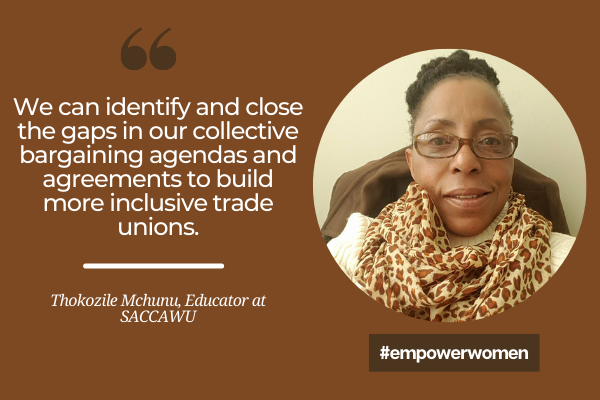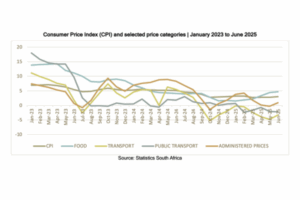Thokozile Mchunu, Regional Educator at South African Commercial, Catering and Allied Workers Union (SACCAWU), says we’ve made progress in addressing gender inequality in workplaces, but there are challenges.
Twenty-five years ago in Beijing countries signed on to a global blueprint for gender equality and woman’s empowerment. Are we close to achieving cultures of gender equality and diversity within workplaces in South Africa?
The implementation of gender policies in workplaces in South Africa is very slow despite the commitment of the labour movement and the government to ensure the emancipation and empowerment of all women.
The persistent marginalisation of women in trade unions and other workplaces in South Africa requires us to pause and investigate the disconnect between laws/policies and practice. We have a big responsibility to help build inclusive, affirming and non-violent work environments.
The challenges affecting all workers in South Africa are almost the same and this ought to give new impetus to our understanding of trade union solidarity. For example, many young female workers in the retail and hospitality, security and domestic sectors lament the low wages, late working hours and unsafe or unreliable transportation. In the education sector, the long working hours and dual roles are taking a toll on female teachers especially.
Solidarity is the linchpin of successful movements globally. Thus our organisations must commit to improving information sharing and proven strategies for bringing about equity and transformation in the workplace. We cannot afford to engage in petty politics while facing the fourth industrial revolution, informalisation and increasing incidences of harassment, intimidation and violence in workplaces.
How can we demystify the existing discrimination laws?
Workplace discrimination, violence, harassment and intimidation are pervasive and women workers bear the brunt despite the existing laws, policies and agreements to address human rights in the workplace. From our Constitution to the Employment Equity Act, there are various laws, conventions and policies established to address this issue. The Employment Equity Act states that “no person may unfairly discriminate, directly or indirectly, against an employee, in any employment policy or practice, on one or more grounds, including race, gender, sex, pregnancy, marital status, family responsibility, ethnic or social origin, colour, sexual orientation, age, disability, religion, HIV status, conscience, belief, political opinion, culture, language, birth or on any other arbitrary ground. Unfortunately, reporting cases isn’t as robust as we’d like because survivors often fear victimisation and the threat of loss of employment. Thus, we need to be vigilant and deal with implementation bottlenecks such as the male-dominated leadership culture in our organisations and companies.
Did you personally encounter discrimination in the workplace?
My first job in the 1980s as a secretary to a warehouse buyer at South Africa’s largest retailer was a baptism by fire. In retrospect, I couldn’t have been prepared for the discrimination and ostracism which was initiated by fellow women at the company. I was 19, fresh from school and with a permanent position in a sector where new employees started on ‘casual’ basis. Workers staged one of the most violent strikes in the retail sector pre-1994 and just as I was settling into the job and that worsened my situation. Strangely, they called me a sell-out. An attempt by a SACCAWU shop steward to mediate the issue, which was really about my age and race, failed and the discrimination became covert. I would have probably resigned except for the encouragement from my father and my decision to join SACCAWU. I was elected as a shop steward after a short while, only to learn it was a ploy by the same group of workers to estrange me from my immediate boss. I grew within the union’s ranks and made a meaningful contribution to the policy development efforts, including the drafting of a sexual harassment policy. I wonder often how my life would have turned out if some comrades in SACCAWU hadn’t taken the time to model me into the effective workers’ representative and leader that I am today.
How did you fare as a woman worker leader in a male-dominated space?
It was challenging being a woman worker leader in a male-dominated environment. Our attempts to push for gender equality were often dismissed as ‘women’s business’. Nevertheless, we established the Women Forum, tasked with developing SACCAWU’s gender policy. Our work as gender activists took off in a difficult economic context characterised by intimidation and runaway unemployment and casualization of work. Consequently, workers felt insecure, vulnerable and burdened with the responsibility of supporting more people due to the increasing poverty. Fulfilling the mandate of the Gender team was challenging, but the women unionists were emboldened and the leadership was determined. I was modelled by great women and now I am committed to modelling young women unionists. I take pride in showcasing SACCAWU’s progressive gender policy and innovative strategies for organising in South Africa and internationally.
The worker leaders in the LRS peer learning process said they felt more confident carrying out their roles. What are some key takeaway lessons for you?
We are fortunate to have worker representatives from different unions and sectors gathering in a safe space to share information and learn. The participants in the LRS/NSF peer learning process have a wide range of experiences in their organisations. We are leaving the workshop with the confidence to speak out without fear or favour about the plight of our members. We are more informed and confident to include workers who’ve been traditionally excluded from collective bargaining agendas. We have the ability to identify and close gaps in collective bargaining agreements and in the context of the changing nature of work. For example, in the retail and hospitality sector, we can confidently engage consumers to advocate for better pay and conditions of work at outlets offering late night shopping. Additionally, we can advocate for workers in vulnerable employment to people in our communities and social settings to have their work made visible, respected and remunerated. At the individual level, we can discuss with confidence the issues that affect all workers, irrespective of our affiliations.








